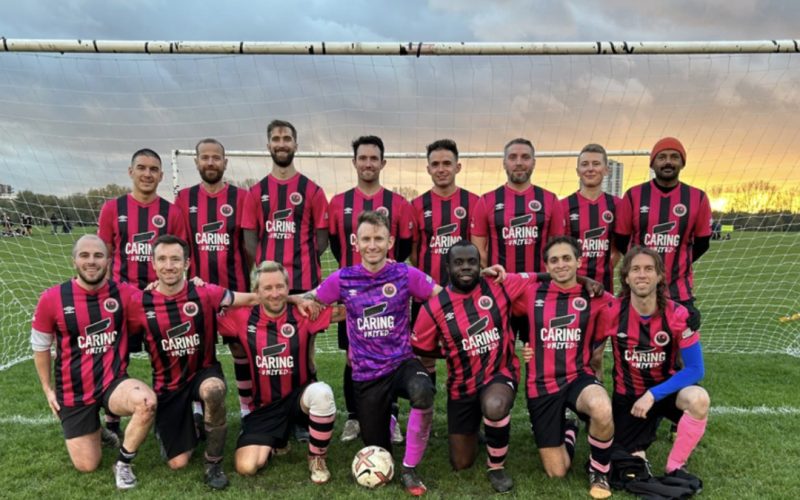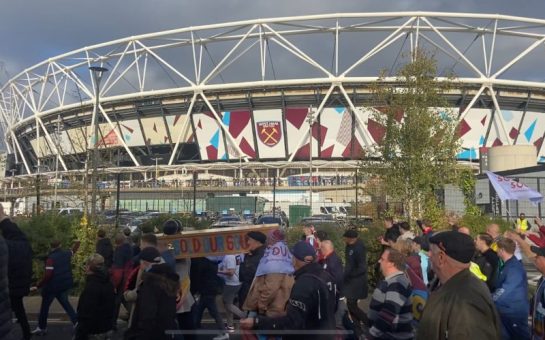February was the annual Month of Action for campaign group Football v Homophobia, when it helps clubs like east London’s East End Phoenix FC fight discrimination.
Originally Phoenix FC, East End Phoenix were formed in 2008 to address an absence of LGBTQ+ inclusive football clubs in east London.
The side compete in the London Unity League, a division of LGBTQ+ friendly teams, playing on Hackney Marshes.
The club focuses on not only providing that inclusive space to play football, but also on opportunities to socialise with fellow players who have had similar experiences.
“London feels like a big place to people when they first come here,” said James Mabbutt, who joined the club in 2012.
“As a recently openly gay man at that point I was thinking: How do I find a friendship group? How do I make a life in London and enjoy socialising?
“East End Phoenix was that perfect combination for me.
“I immediately felt welcomed and able to talk about things that were affecting me.
“I really just got a sense that people understood and wanted to learn more about each other, rather than fearing what people might find out about you which I sensed when I was growing up.”
Football’s improved inclusivity has been hard to ignore.
When Mabbutt joined Phoenix in 2012, the London Unity League featured six teams, having been founded by four sides six years earlier.
Now the league includes ten teams, including representation from Charlton Athletic and Millwall.
Furthermore, last year Blackpool’s Jake Daniels became the UK’s first openly gay professional footballer since 1990.
However, Mabbutt thinks there is still a way to go as while playing for a friend’s team, he was a victim of homophobic verbal abuse in reaction to a tackle he had made.
He said: “I was obviously very unhappy about that. To be fair to him he was very apologetic afterwards.
“But I think being part of East End Phoenix and the LGBTQ+ community in football gave me the confidence to say: ‘That’s not an ok thing to say. You need to reflect on that’ – a greater sense of confidence than I ever had when I was growing up playing youth football.
“A lot of our members have spoken about how they’ve felt excluded from football in the past, and that includes me. But abuse does still happen now, and it does happen to me.”
This confidence is helped by campaigns which highlight the issues faced by players such as Mabbutt.
Football v Homophobia (FvH) is one group championing such campaigns, with last month’s Month of Action – LGBT history month – involving matchday visits to partnered clubs and culminated in an awards ceremony at Manchester’s National Football Museum.
Mabbutt added: “What campaigns like FvH’s definitely help provide is that element of confidence for players who are looking to get back into the game, or just start playing for the first time.
“I think they provide a real focus for people like us to say we’re here all year, but in order to get this message out and amplified they’re really important for us.”
FvH has associated ‘champion’ clubs all over the world, from Mexico to Weston-Super-Mare, and was formed in 2009 to raise awareness of LGBTQ+ discrimination across football.
Jon Holmes, who works on the FvH campaign, said: “There’s a great appetite to celebrate the LGBTQ+ community who are part of football, and who help to make the game more inclusive for everyone.
“It was challenging to get clubs to think about this issue and to understand that in order to challenge this deep-seated homophobia, there needed to be a concerted effort to help people in all areas of football. Not just fans but also players.
“We needed to create more inclusive spaces.”
February’s Month of Action was part of the drive to create those spaces.
“We’ve had clubs like Tottenham at the top end of the game dedicating matches to FvH in February, but also all the way down the pyramid to grassroots games,” Holmes added.
“To see that community engagement with FvH is fantastic.”
The organisation now look forward to the Football v Transphobia week of action at the end of March.
“FvH is also challenging biphobia and transphobia in the game,” said Holmes.
“The rise of those attitudes in wider society has been much more in focus and it’s perhaps become more challenging for people who are trans and non-binary to find a place in football.”
After February’s campaign, and the difference it made for champions like East End Phoenix, FvH will hope its fifth annual Football v Transphobia week can be as successful as its 13th Month of Action was.
Image credit: East End Phoenix FC





Join the discussion